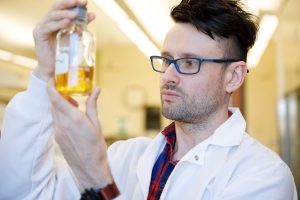
Researchers are using zombie-like cells that behave normally on the outside, but are filled with magnetic particles inside, to screen potential drugs from natural products.
Discovered at The University of Alabama, the method could quicken a laborious task that slows drug discovery, according to findings in a paper published in the journal Nanoscale.
The method uses magnetic nanoparticles coated with a biological cell membrane as a lure to fish out pharmacologically active compounds from plants and other natural organisms such as fungi. It quickly sorts through hundreds, possibly thousands, of compounds found in a natural product in a few days, a process that can take weeks or months using traditional screening methods.
The work was done in the labs of Dr. Lukasz M. Ciesla, UA assistant professor of biological sciences, and Dr. Yuping Bao, UA associate professor of chemical and biological engineering. The lead author is Dr. Jennifer Sherwood, a former researcher in Bao’s lab who earned her doctorate from UA in 2018.
“This solves one of the main problems and bottlenecks in drug discovery from natural products,” Ciesla said. “It dramatically speeds up the process of the identification of new drug leads.”
Ciesla stresses this method is only a first step in the long process of creating drugs to treat a disease, but it shows promise in helping find medicinal uses from natural products.
This research was supported by the National Science Foundation and the Alabama Life Research Institute.
Learn more about the new method by reading the full article on the UA news site.